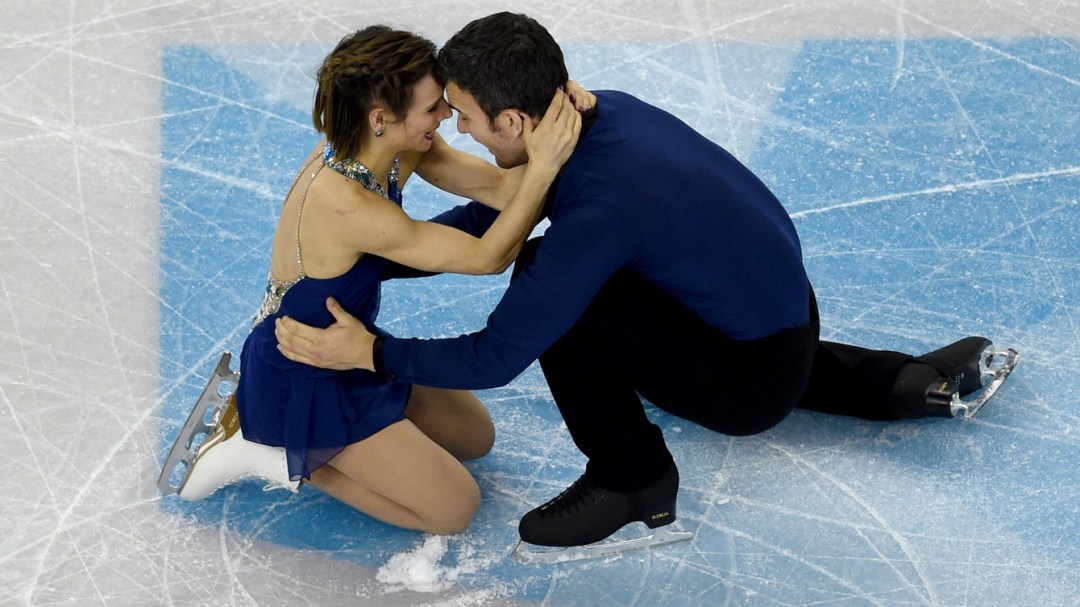Duhamel and Radford repeat as world champions in pairs figure skating
It’s not often that reigning world champions can fly under the radar. But that’s what Meagan Duhamel and Eric Radford did coming into the world championships in Boston and it’s what helped them lay down their two best programs of the season to become Canada’s first back-to-back world pair champions since 1960.
“I think a lot of people drew a conclusion based on our season that we weren’t quite as strong contenders as say compared to last season where we won everything,” Radford said after their free skate to Adele’s Hometown Glory that was nothing short of brilliant. “It was great because it’s difficult not to doubt yourself when everyone else has that expectation of you and to go out there and skate like that, it just shows that no matter what the expectation is, as long as we believe we can do it, we can make it happen.”
They skated just after China’s Wenjing Sui and Cong Han, who had been the short program leaders. But based on the crowd reaction and the score (143.62 in the free skate, 224.47 overall), the Canadians knew the opening was there for them.
RELATED: Duhamel/Radford go from struggling to winning worlds
Feeling nervous but calm, they opened with a huge yet gentle triple twist, following up with their trademark triple Lutzes, the most difficult side by side jumps done by any pair. Then it was onto the throw quad Salchow, the only successful one of the competition, cementing their place as leaders of the current quad revolution in the discipline. Their free skate was calm and patient, with superbly in sync side-by-side spins, an element that doesn’t get much attention but helped create a connection with the audience.
“When we feel their energy and they start cheering for a spin or the exit of a lift, not big trick elements, it really inspires us to want to give more back to them,” Duhamel said of the symbiotic relationship skaters aim to create.
The cheering continued through the throw triple Lutz and two final lifts before they closed with the death spiral.
https://www.youtube.com/watch?v=R2aj1HKG0L4
“I was waiting for him to put up that last lift because I was going to explode,” exclaimed Duhamel. “After that I knew it was over. I knew we had done enough and the audience was going crazy. I could hear our coaches right there at the boards screaming along.”
The always emotional Duhamel, whether the performance was good or bad, let out a yell (“I don’t even think I was saying words!”) while her partner tried to maintain his concentration through the final lift that’s riskier for him than it is for her.
“I heard her screaming and it brought a smile to my face at the very end,” added Radford. “When you can have those bursts of a moment in the middle of a program like that it’s very surreal.”
“Eric’s always the calm to my storm at the end of really great skates, but he is just as excited as I am,” Duhamel made sure to note.
RELATED: Duhamel – vegan lifestyle | Duhamel/Radford win worlds 2015
Their final free skate score was 153.81 with an overall total of 231.99, demolishing their previous personal bests and second best all-time. They are now just the third Canadian pair to win multiple world titles, joining Barbara Wagner and Robert Paul who won four straight from 1957 to 1960 and Frances Dafoe and Norris Bowden who were victorious in 1954 and 1955. This is also their fourth straight trip to the world championship podium, the first Canadian pairs to have such a streak since Isabelle Brasseur and Lloyd Eisler from 1990 to 1994.
It was a great day all around for the Canadian pairs. Lubov Iliushechkina and Dylan Moscovitch placed seventh, ensuring Canada will have three teams at next year’s worlds in Helsinki. They notably defeated Olympic champions Tatiana Volosozhar and Maxim Trankov in the free skate. Kirsten Moore-Towers and Michael Marinaro were an impressive eighth in their worlds debut together.
Ladies – Free Skate
In the final event of the world championships, Gabrielle Daleman cried tears of pride after her near-clean seven triple performance earned her a pair of personal bests, 128.30 for the free program and 195.68 overall to finish ninth. It was her first time inside the top 10 after finishing 13th and 21st the last two years.
“I’m so proud of what I’ve done all season. And to show this at the world stage and to get five points close to 200 internationally is just an unbelievable feeling. It just shows how much I’ve grown.”
Nervous all day, she was able to block out the capacity crowd in Boston and just enjoy her time alone on the ice. Current Canadian champion Alaine Chartrand had been hoping to bounce back from a disappointing short with a confident long program but ended up in 17th place.
The big news for the United States was that Ashley Wagner broke a 10-year medal drought in the ladies’ event, once their bread and butter, with a silver medal. She brought down the house to finish sandwiched between a pair of Russians, new world champion Evgenia Medvedeva who was junior world champion a year ago and bronze medallist Anna Pogorilaya.
Friday, April 1
So maybe there was no medal, but there are also no regrets for Patrick Chan, who finished fifth in his return to the world championship stage on Friday night.
Chan entered the free skate in third place after the short program, but was the last to skate in an event that had seen numerous standout performances which brought the packed house to its feet multiple times. Top among them was Spain’s Javier Fernandez (216.41 in free skate, 314.93 overall), who won his second world title in a row by overcoming the largest point gap ever after a short program (12.04) under the current scoring system to defeat Japan’s Yuzuru Hanyu (184.61 in free skate, 295.17 overall). China’s Boyang Jin took the bronze (181.13 in free skate, 270.99 overall) on the strength of his four quads.
From the moment he stepped out, Chan sensed his program would be difficult just by looking at the condition of the ice, which had been through 11 men’s 4 ½ minute programs and two six-minute warmups since the last resurface.
“I was just distracted by the look of it,” he said. “It has this frost, it just doesn’t have that shine to it. It sounds really stupid but I know my ice really well and I just knew from the beginning.”
https://www.youtube.com/watch?v=fU2Q9N0mosA
“I felt like there was a lot of ruts and I couldn’t be confident when I stepped forward to set my edge that my edge would go straight. It would skip and jump over bumps or go right or left,” Chan elaborated. “It’s very personal to me. I know that none of the other skaters probably bring it up but for me I like to use the flex of the ice and it almost rebounds me and gives me speed into my jumps.”
Intending to open his free skate with a quad toe-triple toe combo, Chan tripled out the opening jump. He was able to land a clean triple Axel but then, by rule, had to make sure his second quad was in combination. But he hit the boards on landing that, something he says he hasn’t done in a while, which then hurt his momentum heading into his step sequence.
“In a perfect world I just do the quad on its own and it just kicks me into the footwork with flow,” he said. “Today I had to push through those turns and fighting with the ice just was not ideal.”
Chan went on to single a second planned triple Axel and doubled a planned triple flip, leaving a lot of points on the table. His free skate score was an eighth-best 171.91 for an overall total of 266.75. This was after Hanyu had opened the door when he fell on one of his three quads and put his hand down on the landing of another as well as his triple Lutz. It was his Toronto-based training mate Fernandez who was able to take advantage with the skate of a lifetime, executing three perfect quads and not a step wrong to come within three points of Hanyu’s record free skate score.
https://www.youtube.com/watch?v=7nrbg87qH9k
As for whether Chan’s performance changes how he feels about his comeback season?
“Maybe immediately yes at the moment, but I think tomorrow I’ll look back at the entire year and there’s really nothing to be upset about,” he said. “Yeah it stinks to be in fifth after third in the short, but it’s good to be here and it’s good to be feeling that pressure.”
“I feel like I have a renewed idea of why I’m doing this.”
Pairs – Short Program
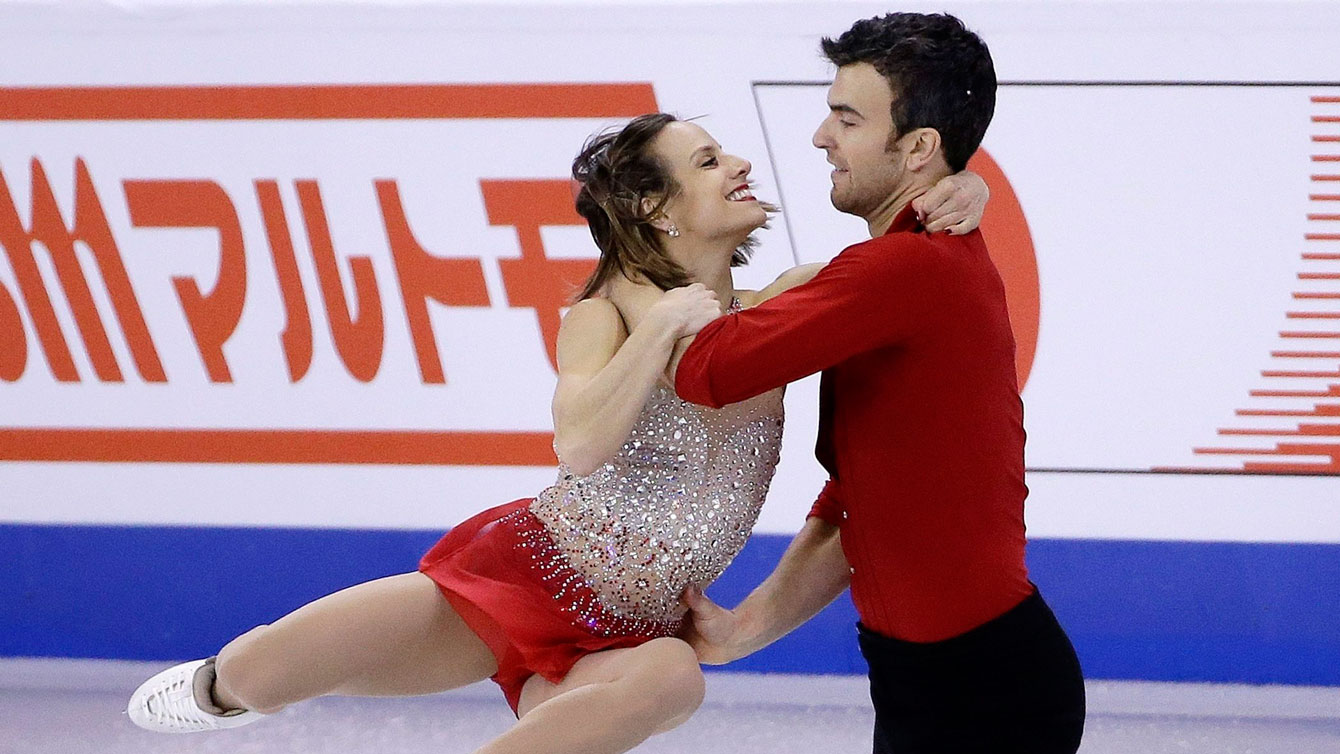
Meagan Duhamel and Eric Radford during their short skate at ISU Figure Skating World Championships on April 1, 2016.
Meagan Duhamel and Eric Radford find themselves in prime position to defend their title and all three Canadian pairs are in the top 10 after a stellar day of short programs at the world championships.
Skating last, Duhamel and Radford finally got the short program performance they’ve been looking for all season to sit in second place with a personal best score of 78.18. At Skate Canada, NHK Trophy, the Grand Prix Final and even the national championships, they had jump and/or throw issues before illness struck Duhamel at the Four Continents, leaving her barely able to skate. Putting their aimless and “flighty” attitude behind them, they hit their side by side triple Lutzes as well as the throw triple Lutz in Boston.
https://www.youtube.com/watch?v=t_TKgP0WCeA
“We’ve been getting sick of finishing that short program and feeling frustrated,” said Duhamel. “It was kind of like enough is enough. We’re coming here today, I didn’t care if I was upside down on my triple Lutz, I was landing it. That was the end of the story.”
“I think this is the best we’ve felt before stepping on the ice and while we were on the ice getting ready to take our starting position we finally found that focus we had last season and that sort of comfort zone that we haven’t been able to achieve during the rest of the season,” added Radford.
Like all the Canadians competing this week, they are also clearly enjoying an essentially home crowd in Boston. Duhamel noted that there were even cheers when they hit a musical accent in their pair spin, which isn’t normally a highlight element.
“It made me really happy and they continued on right to the end of the program,” she said. “I actually hit our ending position earlier than Eric because I couldn’t hear our music. I just assumed it had ended.”
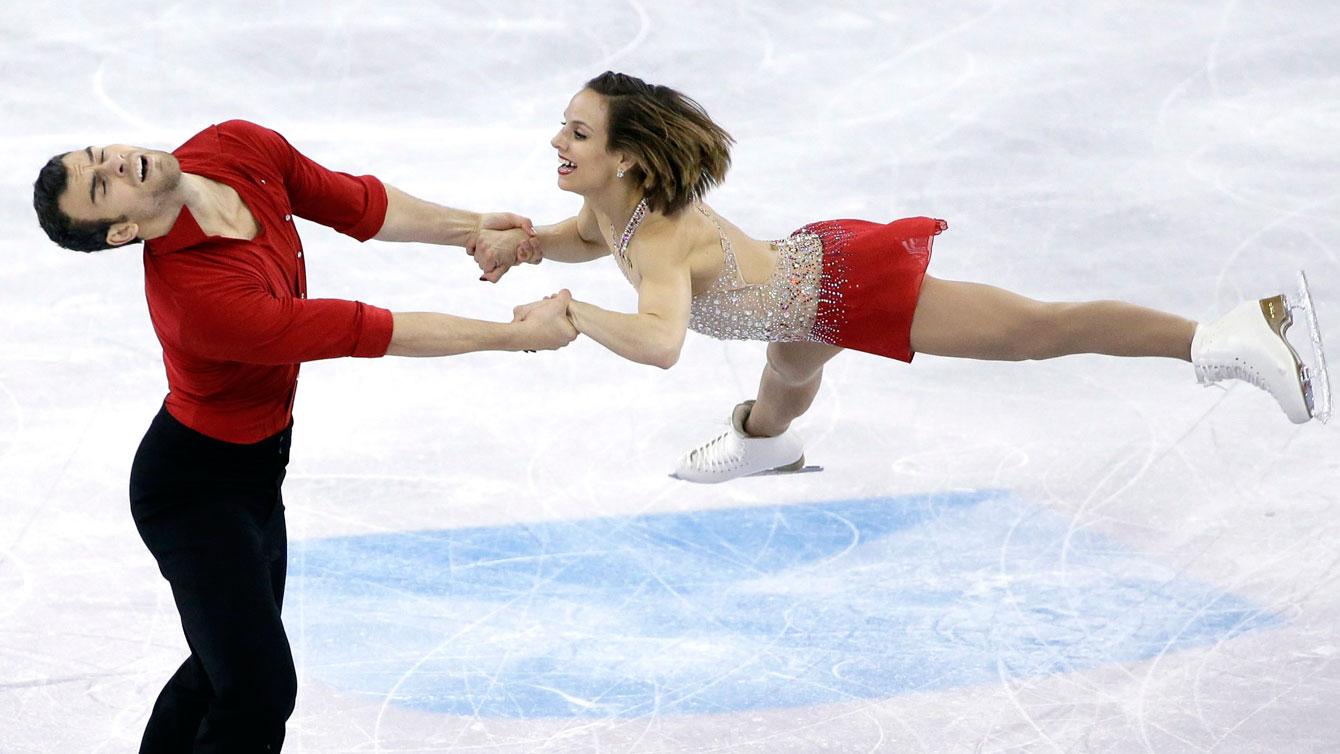
Meagan Duhamel and Eric Radford during their short program at ISU World Figure Skating Championships on April 1, 2016.
The crowd had already seen two personal best performances by Lubov Iliushechkina and Dylan Moscovitch (68.17) and Kirsten Moore-Towers and Michael Marinaro (66.06), who sit in eighth and 10th place, respectively. For the latter, it was a great comeback from injury suffered at the national championships in January when they fell on a triple twist in the short program. Dislocated ribs and bruises kept them off the ice for three weeks and they only learned they would compete at the worlds a couple of weeks ago as injury replacements for Julianne Seguin and Charlie Bilodeau.
https://www.youtube.com/watch?v=t4JxQdcao1c
Looking ahead to Saturday’s free skate, Duhamel and Radford will skate second in the final flight, after current leaders Wenjing Sui and Cong Han (80.85) of China. Current Olympic champions Tatiana Volosozhar and Maxim Trankov of Russia are in third (77.13) and will close the competition. With the quad Salchow in their arsenal, the Canadian champions know that if they can re-discover Friday’s head space they’ll get the result they’re looking for.
“If we do (the free skate) the best we can I’m confident it’s going to be enough to win a gold medal,” said Duhamel. “If it’s not, but we finish the program feeling like we did today, we’re going to be happy with any colour of medal.”
Men – Free Skate Preview
By now you’re probably aware that Patrick Chan is at his first worlds since 2013 when he won his third straight title. He, of course, took last season off after his silver medal at Sochi 2014. So what are his podium prospects in Boston? After a third place finish in the short program: quite positive.
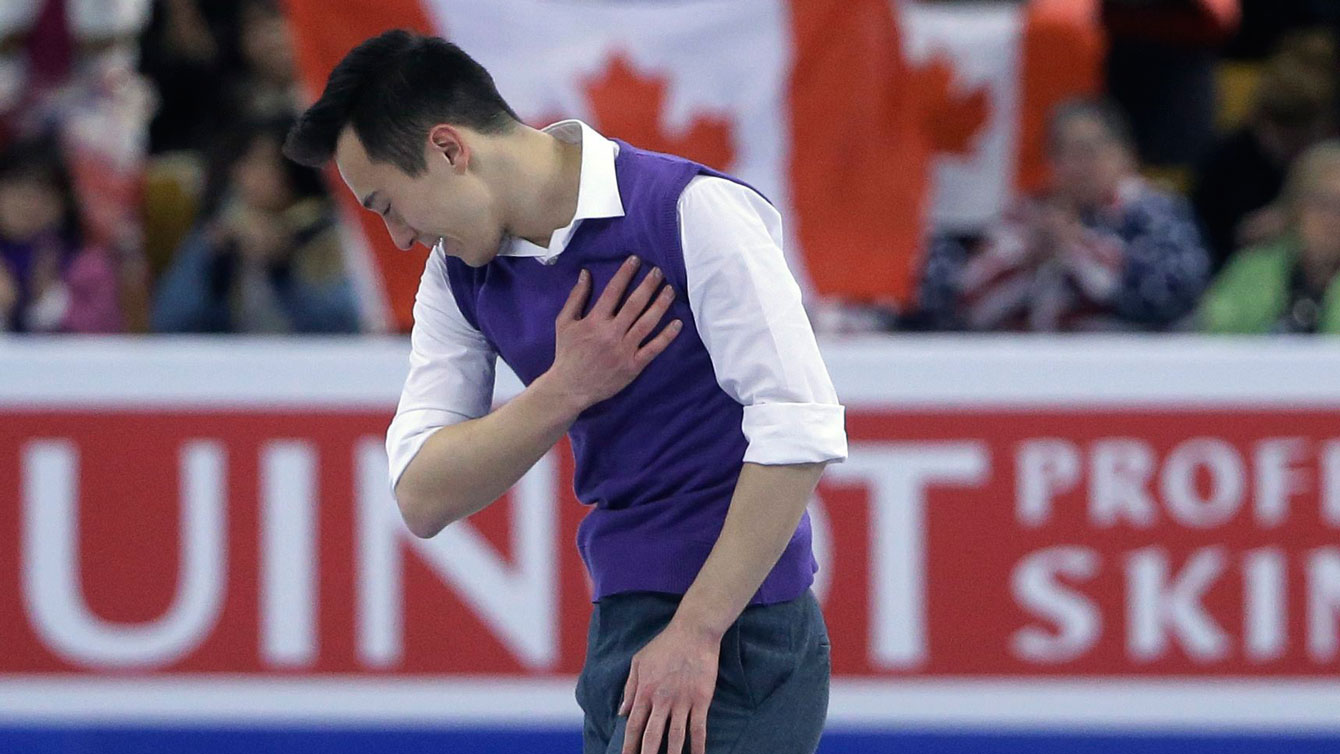
Patrick Chan at the conclusion of his short program at the world championships on March 30, 2016.
The numbers tell a lot of the story.
Chan scored 94.84 in the short program, leaving him 3.68 points behind reigning world champion Javier Fernandez (98.52) and 15.72 behind Olympic champion Yuzuru Hanyu (110.56). But he has a 4.10 point buffer on fourth place Shoma Uno (90.74) and 5.28 points on fifth place Boyang Jin (89.86).
At this point, it’s pretty much assumed that the gold is Hanyu’s to lose – and it would take a disaster of a free skate for him to do so. He astounded the world in the fall with back-to-back record free skate performances at NHK Trophy and the Grand Prix Final. With three quads (two toe loops and a Salchow) and two triple Axels at the latter, his base technical score was 95.19. Add in some huge grades of execution and his final tech mark was a whopping 120.92. He also earned 98.56 for program components, which is especially impressive considering 100 would be a perfect score. His total for the free skate was 219.48.
https://www.youtube.com/watch?v=QWQs–Rgl4k
Chan does have a chance to catch Fernandez for the silver. The Spaniard’s top free skate score this season is 201.43 from the Grand Prix Final. He also topped the 200 mark to win his fourth straight European title (200.23) where his program included two quad Salchows, a quad toe and two triple Axels.
Chan’s free skate has one less quad than both Hanyu and Fernandez, with “just” two quad toes. But in the second half of the season he did increase his tech content by adding in a second triple Axel. With a clean performance at Four Continents he scored a personal best 203.99.
https://www.youtube.com/watch?v=EAI44TaFIHs
Now, while scores cannot really be compared across competitions, how did Chan out-score Fernandez despite having a lower base value? It’s partially due to how well the elements were executed. Chan’s tech score at Four Continents jumped by 21.18 while Fernandez increased by 11.74 at Europeans. With his outstanding skating skills, choreography and interpretation, Chan also generally gets the nod on the components side, earning 97.14 at Four Continents versus Fernandez’s 94.36 at Europeans and 96.78 at Grand Prix Final.
https://www.youtube.com/watch?v=_qkganaFXXc
Of course it will all come down to what they lay down in competition on Friday night.
In their final practice Hanyu had a pretty solid runthrough. He didn’t attempt all his jumps, but got in all three quads (one with a hand down) and both triple Axels. Fernandez appeared to be having some trouble with his skates and was barely warmed up by the time it came to do his runthrough, so he skated through his jumps. Attempting them solo afterwards, he had some landing issues. As for Chan, prior to his music playing he landed some beautiful triple Axels and quad toes, but the jumps weren’t all there in his runthrough, popping a quad and an Axel. But it’s not uncommon for skaters to have poor practices before standout performances. Better that than leaving all of the success on the practice ice.
Jin is a bit of a wild card. He has an incredible four quads planned (lutz, Salchow, two toe loops). At Four Continents that got him 110.66 for tech. But his components are not up to the level of those ahead of him, so he’ll need the three at the top to make errors to jump onto the podium. Same with Uno, whose content is on par with Chan.
Bottom line, it’ll be fascinating to watch.
Thursday, March 31
Ice Dance – Free Dance
On a night when personal best scores were abundant, there was no third straight trip to the world championship podium for Kaitlyn Weaver and Andrew Poje, who finished fifth on Thursday night in Boston.
The Canadian champions had issues with their opening element, the synchronized twizzles – “I don’t know what it was, if it was a brain fart or what,” said Poje – which led to it only being scored a level two, unlike the level fours they earned on everything else. They totaled 110.18 in the free dance for an overall mark of 182.01. The four teams who finished ahead of them, including now two-time world champions Gabriella Papadakis and Guillaume Cizeron, achieved all level four elements. The French also set a world record free dance mark of 118.17 to top Americans Maia and Alex Shibutani and Madison Chock and Evan Bates.
https://www.youtube.com/watch?v=wAj_VhTZEmU
Poje noted that although they felt the best they’ve ever felt coming into a competition, there was a disconnect between that preparation and their performance.
“It’s really difficult and it took us a long time to master. I don’t want to say it’s too hard, I don’t think it is,” Weaver said of their Bitter Earth free dance. “These are the programs that push us to a new level and because of this we’ll be even better next year.”
“Our goal is longterm,” she continued. “Our goal is 2018 and we still have many steps to go so we’re not feeling too sad about this right now.”
Just like last year, they started the season extremely strong, with victories in their two Grand Prix events and at the Grand Prix Final. But just like last year, that success didn’t translate to the biggest event, the world championships, a trend Weaver called discouraging.
Still there are positives to be celebrated and there’s nothing a little champagne with family can’t fix.
“Hopefully they’ll help our bruised egos a little bit,” said Weaver.
Sitting fifth after the short dance, Piper Gilles and Paul Poirier were ecstatic to be skating in the final flight, but that excitement may have also hurt them as they dropped to eighth overall (173.07).
https://www.youtube.com/watch?v=uFFJrutWWjs
“We gave it a little bit too hard at the beginning so we both felt really tired at the end,” said Poirier.
“Being in the last group is definitely a new experience for us so we’re going to take that and just really work on our nerves,” added Gilles. “We wanted to fit in and I think eventually we will be there again and we’ll have to learn to cope with those. All smiles.”
The combined placements were still enough to qualify Canada three ice dance berths for next year’s worlds in Helsinki.
Ladies – Short Program
Breathe. Confident. Comfortable. Calm. That’s what Gabrielle Daleman told herself over and over during her spectacular short program at the ISU World Figure Skating Championships that earned her a personal best score of 67.38 to sit in eighth place heading into Saturday’s free skate.
Daleman was so impressive that she finds herself ahead of Japanese star and three-time world champion Mao Asada, who stumbled out of her trademark triple Axel. For her part, Daleman landed a beautiful triple toe-triple toe combo to go with a triple Lutz and double Axel. When she finished, she jumped and fist-pumped as the audience roared.
“I’ve always had trouble with the short so just to finally lay a clean short program down, not only this year, but doing it that well and that confident was such a relief,” said Daleman, describing herself as overwhelmed. “It wasn’t just that I skated clean and I did my job, it was I finally did it in front of basically a home crowd and it was like all my hard work finally paid off.”
https://www.youtube.com/watch?v=t_xjxtezxBw
The last couple of months have been plenty hard for the 2015 national champion. Three days after this year’s Canadian championships she went to coach Lee Barkell with a problem.
“Lee, there’s something wrong with my foot,” Daleman recalled. “If I take it out of my skate there’s no way I’ll be able to put it back.”
Dealing with plantar fasciitis since Sochi 2014, Daleman also has arthritis and tendonitis in her right foot which caused everything to swell. With a focus on the worlds, she withdrew from the Four Continents Championships in February to recover smart and recover properly.
“I was probably in physio six, seven days a week for about three hours doing exercises, heating, icing, everything I could,” said Daleman, who was off the ice for a couple of weeks. “I hate needles but I was actually doing acupuncture to get the swelling out.”
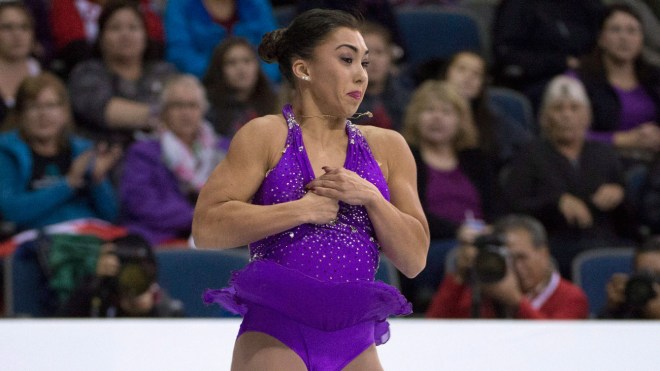
Gabrielle Daleman performs a jump during her short program at Skate Canada International on October 30, 2015 in Lethbridge, Alberta.
She also used visualization to get herself the most ready she’s ever been for a competition.
“Not gonna lie, probably spent a lot of money on YouTube. Dad might not be too happy with the phone bill from data,” she said about watching her past programs to put her in the right mindset.
Like Daleman, Alaine Chartrand had been skating well this week, but left it on the practice ice. She struggled with her triple Lutz-triple toe combo and then fell on her double Axel, an easy jump for the woman who’s been training a triple. She is in 17th place. American Gracie Gold leads with 76.43 points, followed by Russians Anna Pogorilaya and Evgenia Medvedeva as well as American Ashley Wagner who are all within 0.82 of each other.
Wednesday, March 30
Men – Short Program
Not only is Patrick Chan back at the ISU World Figure Skating Championships, he’s back in medal contention with a third place finish in the short program.
Skating to Mack the Knife, the short has been problematic all season, with the exception of the national championships. In Boston, the three-time world champion once again did not go clean, falling on the triple Axel. But with a stunning quad toe triple toe combo, a triple Lutz, and level four on all three spins plus his step sequence, Chan was quite satisfied with the midway result.
“I feel good. I feel happy, not disappointed,” he said of the skate that earned him a season best 94.84 points. “It’s been two world championships I haven’t been here. I haven’t been used to this high energy and I think expectations.”
“Third is a great spot to be in going into the long.”
https://www.youtube.com/watch?v=yh8TCT7_1ho
To no one’s surprise, the leader is Japanese Olympic champion Yuzuru Hanyu, who with his quad Salchow, quad toe triple toe combo and triple Axel, came within 0.39 of his world record short program score of 110.95 set at the Grand Prix Final. Hanyu also garnered 17 individual perfect 10.0 program components marks from the judges. In second place is the reigning world champion, Spain’s Javier Fernandez, who also got his quad toe triple toe combo in before falling on his quad Salchow. The mistake keeps silver in striking distance for Chan, with Fernandez just 3.68 points ahead.
“Doing two quads in a short program is unbelievable,” said Chan of his opponents who really raised the bar jump-wise during his year away from competition. “For me, I like to let them go guns blazing and I’m just doing my own methodical work, very thoughtful and I’m thinking of every single step in the program. I’m not just blaring into my jumps and going for it and being disappointed if I fall on a jump because there’s so much more to skating than just the jumps.”
Always a highlight of his programs, Chan’s step sequence here earned +3 grades of execution from all but one of the judges. It was all part of giving the best performance possible for the crowd, which contains a huge number of Canadians who made the trek south of the border.
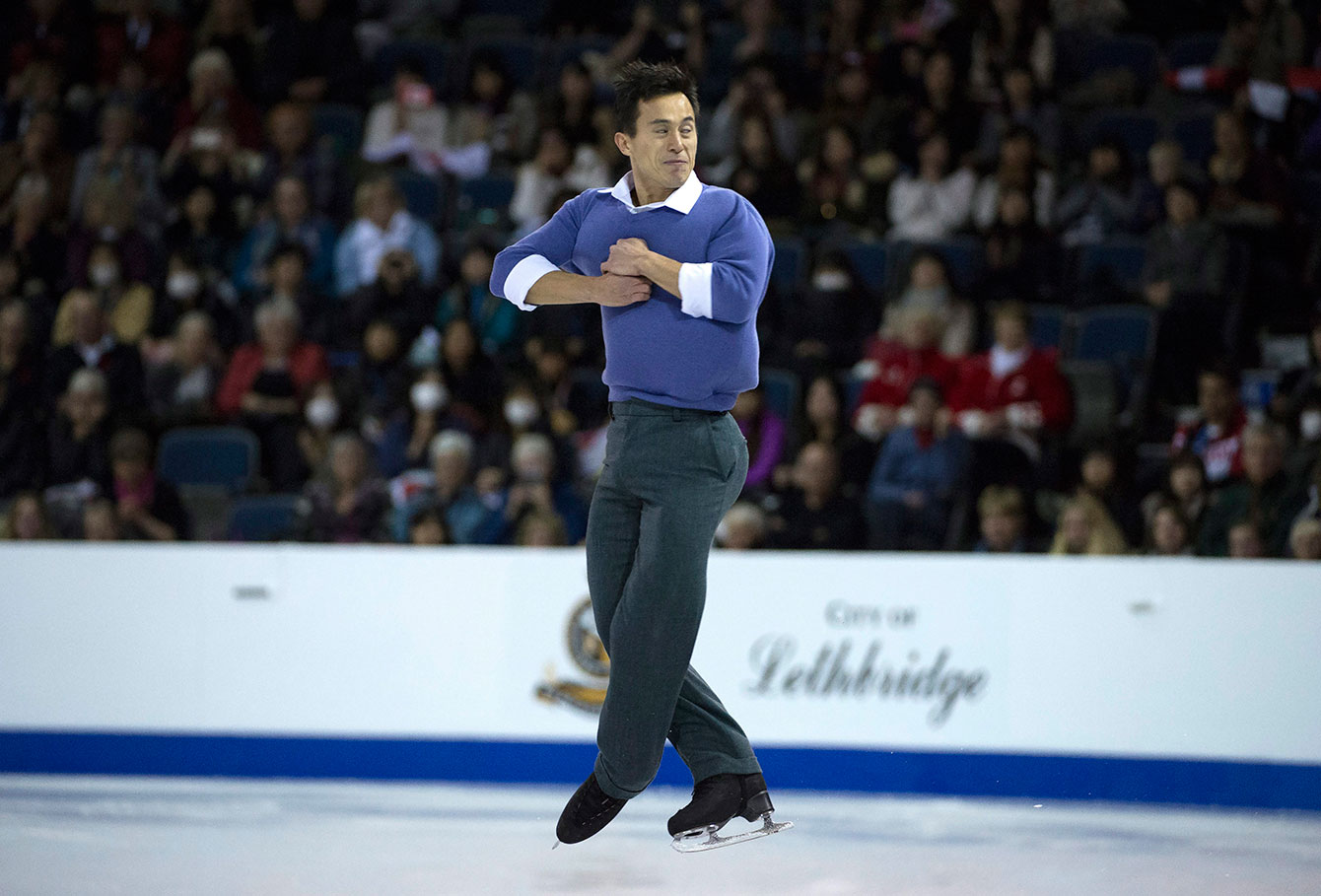
Patrick Chan performs a jump during his short program at Skate Canada International in Lethbridge, Alberta on October 30, 2015.
Conversely, the triple Axel has been a longtime struggle for him, particularly in the Olympic season. One of the things he’s proudest of in his comeback has been improving that jump, saying that he wouldn’t have forgiven himself if he hadn’t gotten it more consistent. The mistake in the short came from rushing his upper body which caused him to slip his left foot on the takeoff.
“At least I know what I did wrong so I won’t do it again,” said Chan, who drew the last start position and will close Friday’s free skate.
It was a much more difficult day for Nam Nguyen. Fifth last year, it was only a couple of weeks ago that he learned he was heading to worlds, given the spot after national silver medallist Liam Firus relinquished it. The thought was that the combination of Chan and Nguyen would give Canada its best chance of reclaiming three men’s spots for next year’s world championships. But with a fall on his quad and a popped triple Axel, Nguyen fell all the way to 27th, meaning he won’t compete in the free skate and Canada will likely once again have just two entries in 2017, which will serve as the Olympic qualifier.
Ice Dance – Short Dance
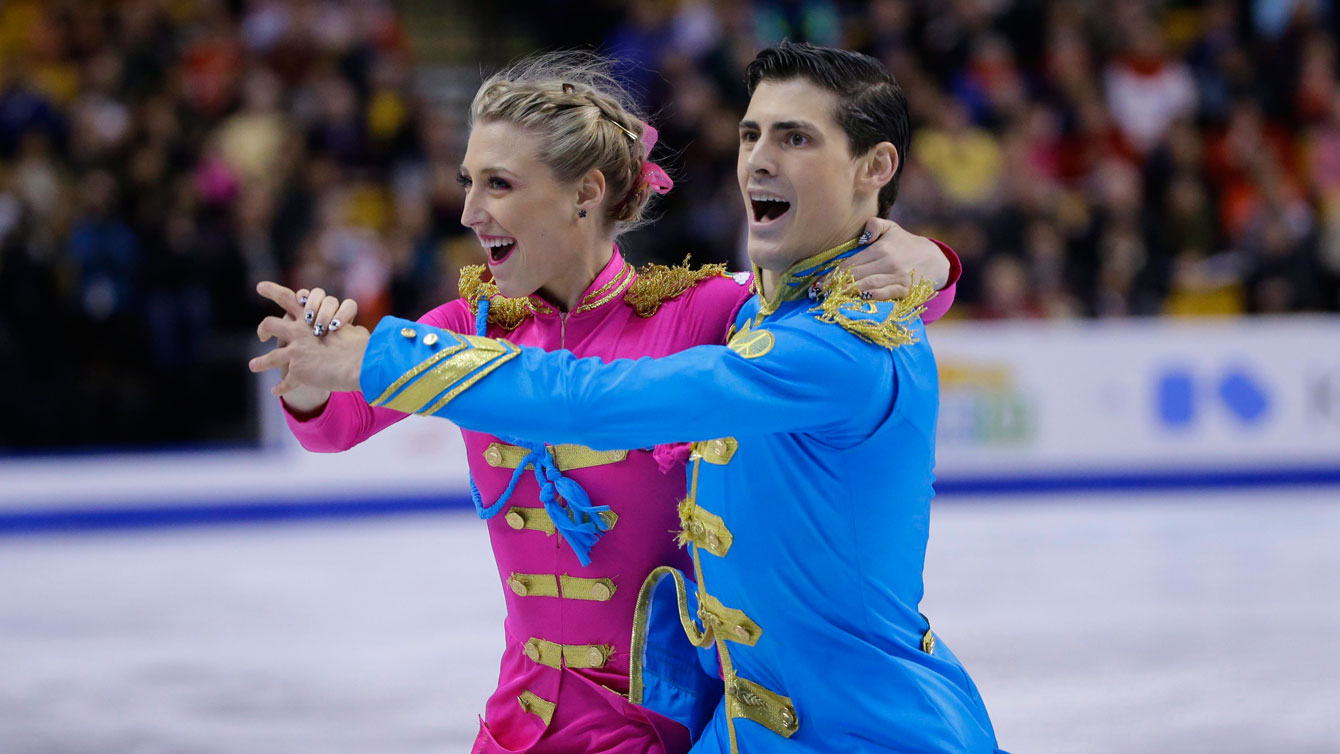
Piper Gilles and Paul Poirier at the ISU World Figure Skating Championships on March 30, 2016.
With Kaitlyn Weaver and Andrew Poje in fourth and Piper Gilles and Paul Poirier in fifth after the short dance, Canada has two teams in striking distance of the podium in Boston.
Gilles and Poirier, who skated last in the penultimate flight, set the bar at 70.70 points, a jump of almost five points on their previous personal best. They hit the new standard by earning all level fours on the five elements, including both sequences of the compulsory Ravensburger Waltz. They were especially thrilled with their performance after having changed the music since their discouraging fifth place finish at the Four Continents Championships in mid-February. They got rid of hard-hitting and staccato Mozart in favour of the audience-friendly and more fluid Norwegian Wood and Ob-La-Di by the Beatles.
“We took such a big risk changing the music,” Poirier said of the program that had to come together in just three and a half weeks. “I think the choices that we made in terms of music, the choices in simplifying the choreography, especially in the partial step sequence and how we’re approaching the key points in the pattern dance really paid off for us, which is something brand new for us. It’s good to see how resilient we are because it’s been a roller coaster season to say the least.”
Pushing all season to be Canada’s number one team – “This is our time right now and we just need to embrace it,” said Gilles – they are just 1.13 points behind two-time world medallists Weaver and Poje, who got hit on the technical side with two elements judged at level three.
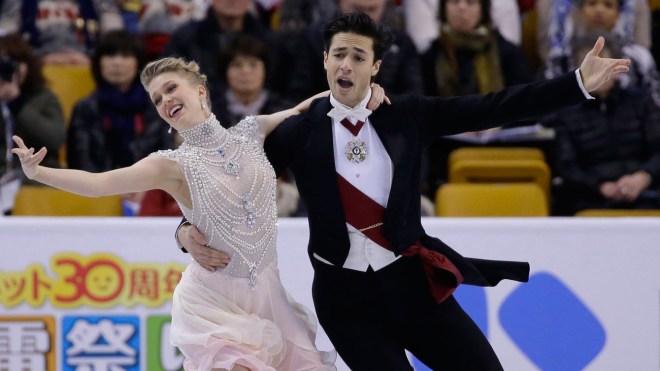
Kaitlyn Weaver and Andrew Poje at the ISU World Figure Skating Championships on March 30, 2016.
“I think we skated very well today,” said Weaver. “It was one of our strongest short dances to date. Where the disconnect was between that and our score I don’t know, but that’s not what we can control.”
“Every caller (technical specialist) is looking for something different,” she continued. “It’s not very standardized so it’s all about the details and something that we overlooked I guess somehow. But we’re already moving forward into the free dance.”
They admitted to some stiffness and soreness after taking a “nasty fall” in practice this morning when Weaver fell on top of Poje when one of their leaps went down, but said it had no impact on their performance.
https://www.youtube.com/watch?v=TpTNeDmQa7Y
Leading the way after the short dance are reigning world champions Gabriella Papadakis and Guillaume Cizeron of France with 76.29 points. They and the second place finishers, Americans Maia and Alex Shibutani (74.70), also earned all level four elements. In third place are last year’s silver medallists Madison Chock and Evan Bates (72.46), also of the US. Canada’s third team, Elisabeth Paradis and Francois-Xavier Ouellette, were the first skaters to compete at the worlds but finished 23rd and did not qualify for the free dance which will take place Thursday night.

